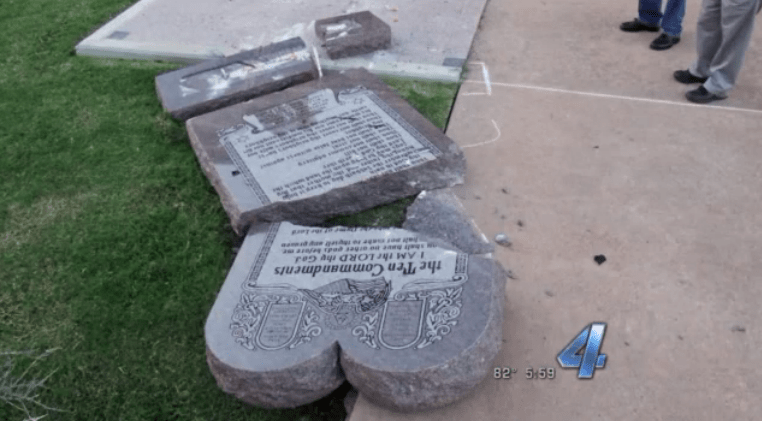Could Ten Commandments monument ruling result in changes to Oklahoma’s constitution?
Published 9:46 am Monday, October 12, 2015

- The rebuilt Ten Commandments monument was removed from the state Capitol grounds last week. In 2014, a man on a self-described "mission from Satan" destroyed the original monument by driving his car into it.
The Ten Commandments monument was removed from the state Capitol grounds last week, but that hasn’t ended debate about the Oklahoma Supreme Court decision that led to the removal.
While visiting Claremore, Oklahoma last week, Oklahoma Attorney General Scott Pruitt said that discussion could lead to big changes — including changes to the Oklahoma State Constitution.
“When you look at other states that have put Ten Commandments monuments on capitol grounds, the U.S. Supreme Court has spoken very clearly, that that is very constitutional,” he said.
Pruitt said the “taking of our own constitution by the Oklahoma Supreme Court, saying it (monument) is unconstitutional, is inconsistent with our First Amendment protections we have under the U.S. Constitution.”
“I’m hopeful there can be a remedy to that,” he added.
Pruitt said there have been discussions by others about repeal of Article II, Section 5 of the Oklahoma Constitution. “I believe if it is going to be interpreted like that, then I believe it needs to be repealed,” he said.
Article II, Section 5 states, “No public money or property shall ever be appropriated, applied, donated, or used, directly or indirectly, for the use, benefit, or support of any sect, church, denomination, or system of religion, or for the use, benefit, or support of any priest, preacher, minister, or other religious teacher or dignitary, or sectarian institution as such.”
The Oklahoma Supreme Court ruled that the monument violated that section and ordered the monument to be removed from the state Capitol grounds in Oklahoma City.
It’s not just about the Ten Commandments — as big as that is — Pruitt said, but it is also about education, since the state is involved that.
“We have scholarship dollars that go to Oral Roberts University and other religiously-affiliated schools. Those monies are now at risk because of the Supreme Court’s decision,” he said.
In addition to education, Pruitt said Medicaid dollars are used at religiously-affiliated healthcare institutions around the state.
“All are religiously-affiliated institutions and also provide a very valid public purpose. In the hospital’s case, it affects healthcare. In the higher education, it effects the colleges,” Pruitt said.
He said the test should be — and always has been — is there a valid public purpose that public dollars are serving?
“I think the Ten Commandments in this scenario clearly has a historical connection. The U.S. Supreme Court has recognized that and unfortunately our court did not,” Pruitt added.
He said there are going to have to be remedial steps to address that.
“Not just because of the Ten Commandments,” Pruitt said.
Diana Dickinson writes for the Claremore (Oklahoma) Daily Progress.




